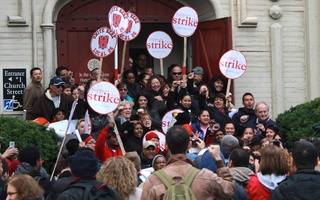{shortcode-34a56c4192f0040e040d1113eacdf00ce9d414a6}
UPDATED: October 26, 2016, 9:00 p.m.
After months of tense contract negotiations, Harvard will pay its full-time dining services employees at least $35,000 a year and cover increased copayments until 2021—a settlement that union leaders say satisfy their demands.
The agreement was ratified 573-1 by dining services employees at a vote Wednesday afternoon, marking the conclusion of a 22-day strike that has rocked Harvard’s campus and led to the closing of several dining halls and campus cafes. HUDS employees will return to work Thursday morning, though “normal operations” will not resume immediately, according to University spokesperson Tania deLuzuriaga.
A press release sent Wednesday from UNITE HERE LOCAL 26—the union that represents HUDS—said employees would not see any increases to their out-of-pocket healthcare costs with the contract, which will last five years.The settlement also includes the creation of a Diversity and Equality Committee to “address concerns regarding diversity and equal treatment of Harvard dining hall employees” and retroactive wage increases of 2.5 percent per year—just slightly below the wage increases Harvard’s largest union, the Harvard Union of Clerical and Technical workers settled last winter.
Over the course of the tense, nearly five-month-long negotiations, the University and the union clashed over wages and health benefits for the HUDS workers. The union demanded a minimum salary of $35,000 a year for employees willing to work year-round. Harvard has said that the HUDS workers made an average of $34,000 a year before the negotiations, while the union put that estimate closer to $31,000.
Local 26 also asked Harvard not change health plan offerings for HUDS employees. Eleventh hour negotiations between the two parties Tuesday eventually did lead to a compromise. In the end, the University agreed to cover copayments, while the union accepted a more modest pay raise for dining employees, and both parties agreed to the summer compensation model.
“Throughout this negotiation, the University has sought a resolution that maintains superior compensation for our dining workers, acknowledging their role as integral members of the Harvard community,” deLuzuriaga wrote in a statement.
DeLuzuriaga wrote that the union agreed to changes in retiree health benefits that “will make their insurance plan consistent with all of Harvard’s exempt employees and 5,000 members of other unions on campus.”
Copayments for employees will increase in 2019, according to Local 26 President Brian Lang, though Harvard will field the cost for the copayments with a “flexible savings account.”
“Harvard will protect lower-wage workers from burdensome cost increases by seeding flexible savings accounts and out-of-pocket reimbursement funds through 2021,” deLuzuriaga wrote.
In addition, Harvard will create a new premium contribution tier for employees who make less than $55,000 per year, in which Harvard will contribute 87 percent of the cost of the lowest-cost plan; the University extended this offer earlier in negotiations. DeLuzuriaga said the premium contribution tier will also be implemented in 2019.
According to deLuzuriaga, HUDS employees who work full-time and are available to work during the summer recess will receive a $3,000 summer stipend beginning in 2020. Until then, the University will pay eligible employees $2,400 during summer months, when dining halls close and many dining services employees are without work. The stipends will be disbursed over three payments throughout the summer, according to Lang.
The stipend mirrors a proposal the University put forward in early October in response to demand for summertime compensation.
For employees who work fewer hours during the academic year, that stipend will be “prorated,” meaning it will be adjusted incrementally in relation to the number of hours an employee works, deLuzuriaga wrote.
The agreement also stipulates that the University reimburse dining services employees medical costs, insurance costs, and transportation costs incurred during the strike.
Lang announced some of the details of the new contract Wednesday afternoon to a crowd of roughly 100 HUDS employees and supporters gathered outside the First Parish Church.
“I can report, coming out of our contract ratification meeting, that we achieved every goal without exception,” Lang said to cheers. “It’s a testament to when working-class people make a decision to draw a line in the sand and say, ‘Enough is enough, and we’re not gonna take it anymore.’”
—Staff writer Brandon J. Dixon can be reached at brandon.dixon@thecrimson.com. Follow him on Twitter @BrandonJoDixon.
—Staff writer Andrew M. Duehren can be reached at andy.duehren@thecrimson.com. Follow him on Twitter @aduehren.
Read more in News
University to Give Thousands of Students’ Information to Labor BoardRecommended Articles
-
News Analysis: HUDS Strike Threat Rooted in HistoryLast week, Harvard’s dining hall workers voted overwhelmingly in favor of a strike after more than three months of stagnant contract talks. But this is not the first time UNITE HERE Local 26, the union that represents HUDS employees, has brandished the threat of a strike in the face of static negotiations.
-
Faust Extols HUDS Employee BenefitsWith a potential strike looming, University President Drew G. Faust said in an interview Tuesday that she is “very proud” of the health benefits package that hundreds of Harvard’s dining services workers have protested.
-
 Harvard-HUDS Stalemate Persists, New Bargaining Session Scheduled
Harvard-HUDS Stalemate Persists, New Bargaining Session Scheduled -
 Students Advocate for HUDS in Harvard Yard, Law School
Students Advocate for HUDS in Harvard Yard, Law School -
 HUDS Workers Approve New Contract, Ending Strike
HUDS Workers Approve New Contract, Ending Strike













